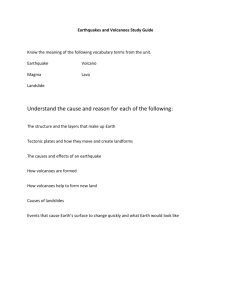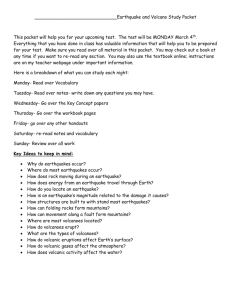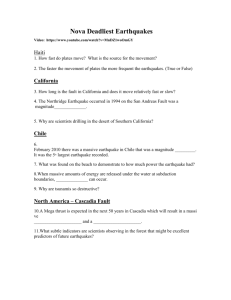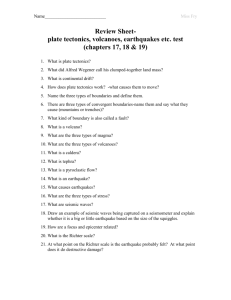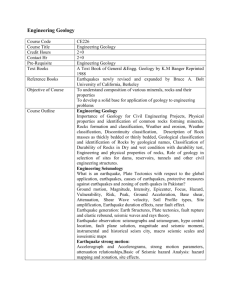Geology of Planet Earth CSCM - 246-01 • Text: Physical Geology,
advertisement
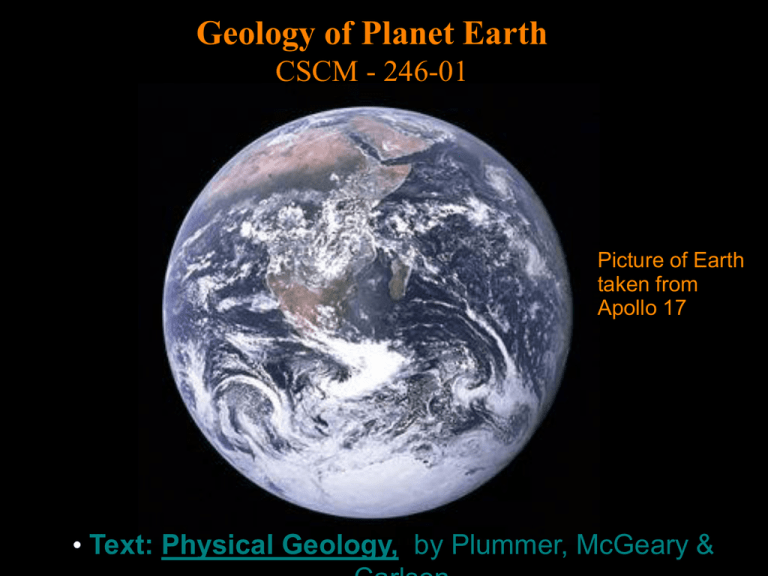
Geology of Planet Earth CSCM - 246-01 Picture of Earth taken from Apollo 17 • Text: Physical Geology, by Plummer, McGeary & Seasons on Earth July Aug Sept Oct Nov Dec These six images were captured by DISCOVR satellite a month apart from July to December 2015. The Earth's axial tilt causes the sun to shine on different parts of the Earth during it's rotation around the ecliptic plane causing cold and warm “seasons” in the northern and southern hemispheres. Seasons on Earth These six images were captured a month apart from July to December 2015 and show how the terminator (night/day boundary) shifts over the course of an Earth year. Taken by Himawari-8, a geostationary satellite parked over the western Pacific Ocean.) • San Gabriel Mountains Rising Behind Los Angeles • Geologic forces have pushed the San Gabriel Mountains to 3000 m above Los Angeles. Rocks have been brought down by earthquakes, landslides, and floods to form a fertile coastal plain that contains rich natural resources. • [Richard Price/Getty Images.] • Where is Earth Science at Work Today ? • Vasquez rocks, LA • Where is Earth Science at Work Today ? • Geologists examine rocks inside Spider Cave at Carlsbad Caverns, New Mexico. • [(a) AP Photo/Val HildrethWerker.] • Where is Earth Science at Work Today ? • A geochemist readies a rock sample for analysis by a mass spectrometer. • [(b) John McLean/Photo Researchers.] • Where is Earth Science at Work Today ? • An astronaut checks out instrumentation for monitoring Earth’s surface. • [(d) StockTrek/SuperStock.] • Where is Earth Science at Work Today ? • Beowulf Cluster at Caltech • - Movie on subduction initiation (Gurnis et al) • - Movie SAF (from SCEC) •Geologic Hazards • Earthquakes – Shaking can damage buildings and break utility lines; large undersea quakes may generate tsunamis • Volcanoes – Ash flows and mudflows can overwhelm populated areas • Mt Pinatubo, Philippines, 1991 • Where is Earth Science at Work Today ? • MOVIE: • Mt. St. Helen's • Eruption • Geophysicists deploy instruments to measure the underground activity of a volcano. • [(c) Hawaiian Volcano Observatory/USGS.] Mt St Helen's Movie Volcanoes on Other Planets Maat Mons Volcano on Venus The surface of Venus is dominated by volcanism and has produced more volcanoes than any other planet in the solar system. It's surface is 90% basalt.c Olympus Mons on Mars More than twice the height of Mt Everest or Mauna Kea on Earth Volcanoes on the Moon ? There are no large volcanoes on the Earth's moon. But much of the lunar surface is covered with basaltic lava plains. The terrain on Mercury is very similar to the Moon. Did you feel the earthquake ? Wednesday, Jan 15, 2014 9:35 am Magnitude 4.5 Depth 5.2 km Near San Andreas fault What is the blue line ? Did you feel the earthquake ? Use your iphone, iPad, or laptops to look up earthquakes anytime! www.iris.edu Did you feel any shaking ? Post what you feel! Southern California Earthquake Center www.scec.org Recent Earthquakes in So-Cal Jan 6, 2016 Apr 4, 2010 Oct 16, 1999 Dec 30, 2009 Feb 22, 2002 Aug 26, 2012 Mar 28, 2014 Jul 29, 2008 Feb 22, 2003 Jun 15, 2004 4.4 7.2 7.1 5.8 5.7 5.5 5.4 5.4 5.4 5.3 Banning N. Baja California Hector Mine Northern Baja California Laguna Salada Brawley Swarm La Habra Chino Hills Big Bear Offshore (nr Coronado) Northridge Earthquake, 1994 (20 yrs ago!) - January 17, 1994, 4:30 am - Magnitude = 6.9 - Blind thrust fault - Difficult to find or predict - Duration 10-20 seconds CSUN Parking Structure Northridge Earthquake, 1994 CSUN Parking Structure HWY I-5 HWY I0 (Santa Monica HWY) Northridge Mall Are YOU prepared for an earthquake ? Does it matter ? Preparedness Now You Tube https://www.youtube.com/watch?v=w9NtvuiVmw8 Northridge Earthquake, 1994 Are YOU ready for the next one ? Fires on Balboa Street Gas line broke when fault ruptured beneath it. Are YOU ready for the next one ? What can you do to be prepared? What can you do now ? Do you have an earthquake kit with you ? Kit in your car ? At home ? At office ? Do you know how to turn off the gas at your home ? Do you & your family have an emergency contact out of the state ? What's in an Earthquake Kit ? - WATER - WATER - WATER - Safety medical stuff - Food - Radio with battery - Flashlight - Blanket - Shoes,clothes - What do you need for 2 weeks ? •Geologic Hazards • La Conchita landslide 1995, 2005 • Landslides, floods, and wave erosion • Hurricanes • Hurricane Katrina on August 28, 2005, a few hours before it struck New Orleans. It was one of the most powerful hurricanes on record, with maximum sustained winds of up to 280 km/hour (175 miles/hour) and gusts up to 360 km/hour (225 miles/hour). [NASA/Jeff Schmaltz, MODIS Land Rapid Response Team.] Hurricane ISAAC will arrive on Florida coast soon. Are we prepared ? • Floods • bef ore • Satellite photo of the great flood of the Mississippi River, 1993. [NASA images created by Jesse Allen, Earth Observatory, from data courtesy of the Landsat Project Science Office.] • Although don't occur every year, they often have a recurrence interval that is much longer, ~10 or 50 years. • What is the recurrence interval of the Santa Clarita river ? Is there any risk of flooding here ? • af te r •Geology in Today’s World • Geology - The scientific study of the Earth – Physical Geology is the study of Earth’s materials, changes of the surface and interior of the Earth, and the forces that cause those changes • Practical Aspects of Geology – Natural resources – Geological hazards – Environmental protection • Uses scientific method • - Explains natural aspects of the Earth • • - How mountains form ? - Why oil resources are concentrated in some rocks and not others ? • Where is Earth Science at Work Today ? • An astronaut checks out instrumentation for monitoring Earth’s surface. • [(d) StockTrek/SuperStock.] • Geologists Seek Answers to Many Questions: What materials make up our planet ? Why are there continents and ocean ? How did the Himalayas, Alps, and Rocky Mtns form ? Why do earthquakes occur in some places and not in others ? Why are there no volcanoes in Kansas ? How did the Earth's surface environment and life it contains evolve over billions of years ? What changes or events are likely in our future ? A New Perspective of Earth • The space age launched spacecraft from which we could view our small blue planet, its climate patterns, oceans, and the bright lights of civilization. • North and South America at night. [Image and data processing by NOAA’s National Geophysical Data Center,Earth Observation Group (http://www.ngdc.noaa.gov/dmsp).] “Sustainable Development” Sustainability involves many issues including economy, politics, resource allocation and managment, things on which many nations do not agree. People must work together to accomplish several objectives: 1. Manage resources 2. Prepare society for inevitable disasters 3. Repair environmental damage 4. Maintain a habitable environment Renewable Resources What is a renewable resource ? What is a non-renewable resource ? A natural resource is renewable if the Earth can replenish it as fast as humans consume it. What about these resources ? 1. Hamburger patties for McDonalds 2. Wooden Pencils 3. Honda Accords 4. Toyota Prius 5. Drinking water in Montana 6. Drinking water in California 7. Coal 8. Oil in the U.S. 9. Oil in Nepal •Monitoring Our Resources • Satellites and land-based instruments now monitor changes in the atmosphere, oceans, and surface to assess resource depletion and human activities. Geologists Study, Recover, & Monitor the Earth's Natural Resources Can you name some of them ? The Earth's Natural Resources • Energy • Water • Raw Materials • Energy • 1. Oil • 2. Natural Gas • 3. Coal • 4. Solar • 5. Wind • 6. Dams • Fossil Fuels Geological Resources and Minerals Oil Peak, Oil Panic ? (Study by Amos Nur - Stanford) U.S., Canada, Japan, Germany, France, Italy, UK, are the bigges consumers of oil reserves worldwide. Oil Peaks – 1960's In the 1850's oil mainly used for kerosene lamps – remaining was burned or disgarded. Current oil production rates peaked in 1960's but U.S. consumption rates increase dramatically above this. Don't panic! -Try to conserve energy -Seek alternative energy sources Petroleum Reserves At current rate of use, worldwide oil reserves should last 30-40 years, and natural gas reserves somewhat longer (estimates from USGS) Oil Consumption World wide by country The US uses more oil than all other countries combined Countries with highest per capita income seeking oil from countri holding the oil wells/reservoirs (Saudi Arabia, Iraq, Venezuala). Tectonic Plates & Plate Boundaries • Divergent boundaries – Plates move apart • Transform boundaries – Plates slide past one another • Convergent boundaries – Plates move toards each other Geology at Macro and Micro Scales • Geologists study tectonic activity at plate boundaries • using surface observables such as: • - Rock and mineral formation • Three types of rocks: • • - Sedimentary rocks • - Igneous rocks • - Metamorphic rocks • Each rock is made up of minerals, atoms • and elements with an atomic structure. •Earth’s Interior • man tle • Compositional Layers – Crust (~7-70 km thick) – Very thin outer rocky shell of Earth – Mantle (~2900 km thick) – Solid interior that slowly over time flows – Core (~3400 km radius) – Outer core – liquid iron – Inner core - solid iron • The Earth's total radius is 6480 km Planetary Interiors Homework: 1. Draw a “pie slice” of the Earth and 2 other planets. 2. Show the crust, mantle, core (if present) 3. Label the depth of each layer (in kilometers – km) 4. Label the mineralogical composition of each michaelite surface ? ? kevinite 3000 km nenaite 6400 km ? Northridge Earthquake, 1994 Are YOU ready for the next one ? Northridge Earthquake, 1994 Are YOU ready for the next one ? Fires on Balboa Street Gas line broke when fault ruptured beneath it. Northridge Earthquake 1994 Northridge - 1.8 miles from CSUN - Shaking 40 seconds - Damaged all 53 CSUN buildings - Damaged 300 other schools - Lower story buildings collapsed - 4 interstate hwy's closed for months (Golden State, Santa Monica fwys) - 15000 people live in tents for days - 10000 without water, elect, gas - Arid climate did not cause liquifaction of soils – sha (compared to 1964 Alaska and 1989 Loma Prieta) - Landslides in Santa Susana, Santa Monica, San G blocked roads and traffic, damaged water lines an - Sylmar – Olive View Hospital – rebuilt from 1971 t - Aftershocks 5.9 1 min after main shock, 5.6 11 hrs
